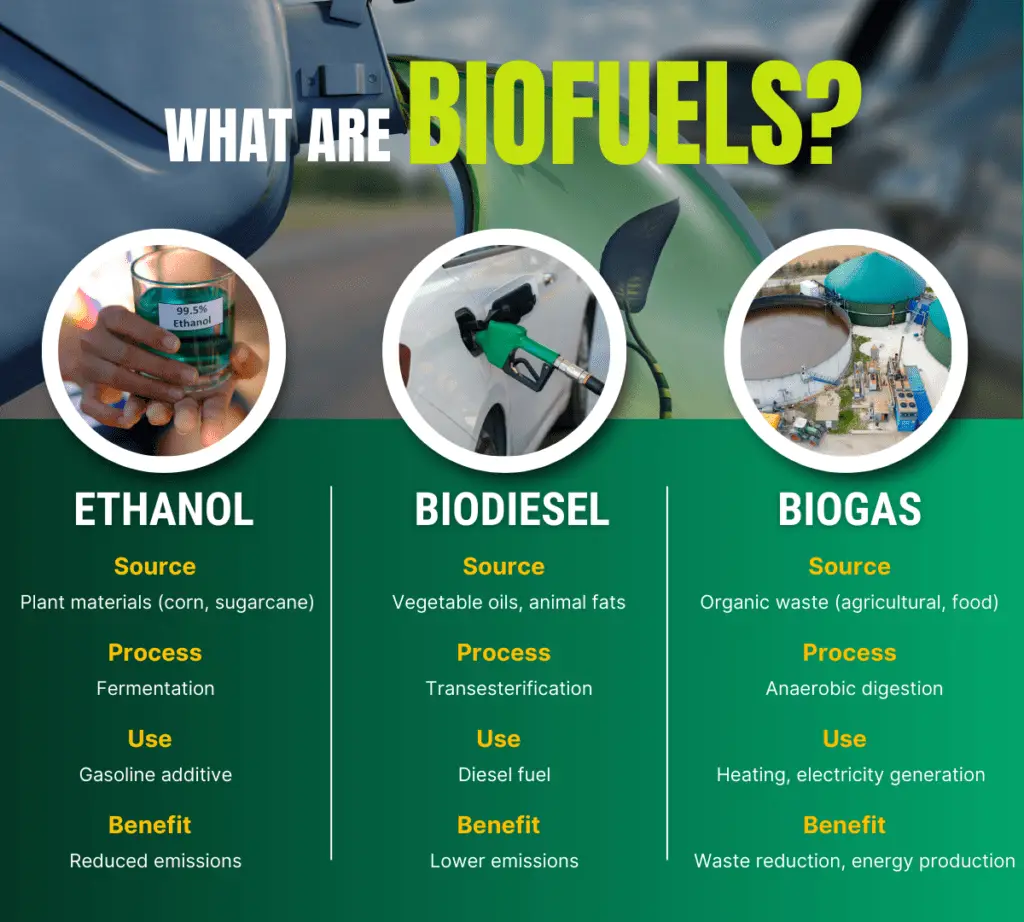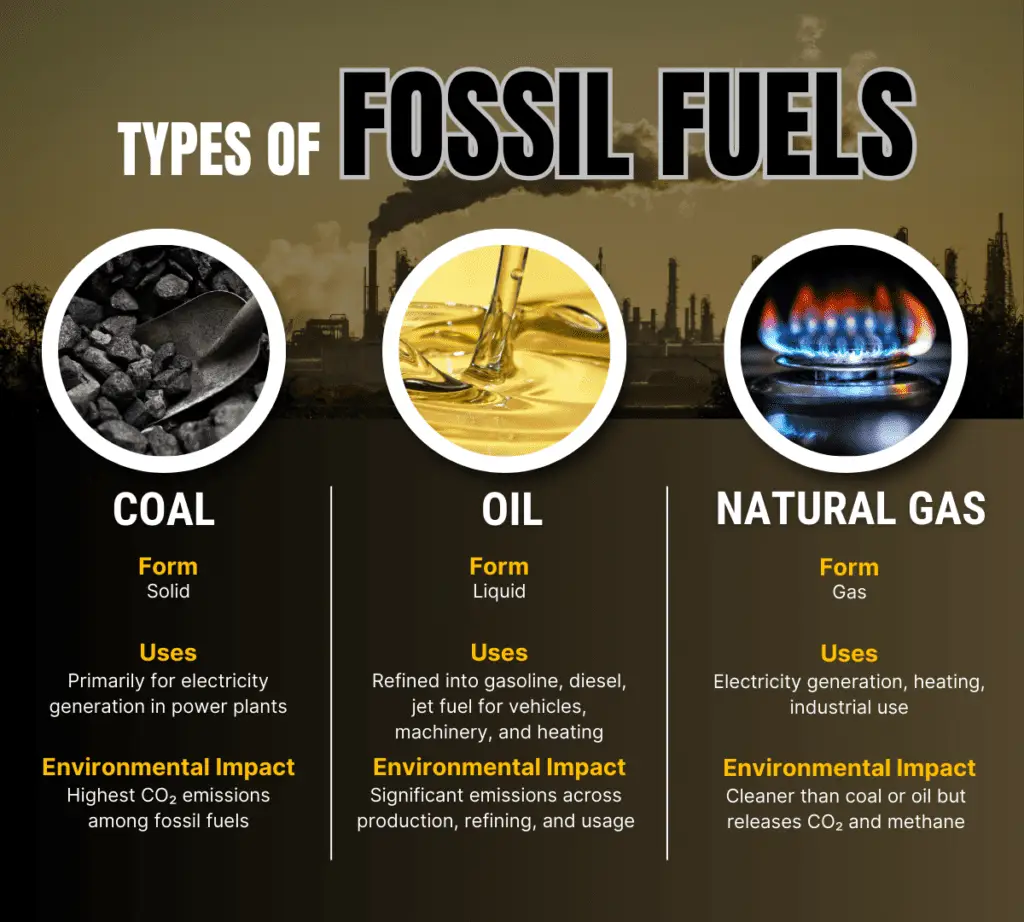As the world searches for cleaner energy solutions, the choice between biofuels and fossil fuels has become increasingly important. Fossil fuels, while historically significant, are known for their negative environmental impact and limited supply. Biofuels, on the other hand, offer a renewable alternative that could help address both environmental and energy security concerns. To make informed decisions about our energy future, it’s essential to understand the key differences between these two energy sources.
Table of contents
- What Are Biofuels?
- What Are Fossil Fuels?
- Key Differences Between Biofuels and Fossil Fuels
- Advantages of Biofuels Over Fossil Fuels
- Advantages of Fossil Fuels Over Biofuels
- Challenges and Limitations of Biofuels
- The Future of Biofuels and Fossil Fuels
- Case Studies: Biofuels vs Fossil Fuels in Practice
- FAQs on Biofuels vs Fossil Fuel s
- Conclusion
What Are Biofuels?
Biofuels are renewable energy sources derived from organic materials, including plants, algae, and organic waste. Unlike fossil fuels, which require millions of years to form, biofuels can be replenished relatively quickly, thus making them an attractive option for sustainability.
Types of Biofuels
Biofuels generally fall into three primary types: ethanol, biodiesel, and biogas, each offering distinct benefits and applications.
- Ethanol: Produced primarily by fermenting plant materials like corn or sugarcane, ethanol is widely used as a gasoline additive. It reduces the amount of carbon monoxide and other harmful emissions in vehicle exhaust.
- Biodiesel: Created through a chemical process called transesterification, where oils or fats (often from vegetable oil or animal fat) are converted into fuel, biodiesel powers diesel engines while lowering particulate matter and greenhouse gas emissions.
- Biogas: Resulting from the anaerobic digestion of organic matter, such as agricultural waste or manure, biogas is commonly used in heating and electricity generation. It provides an efficient way to turn waste into energy.

Sources of Biofuels
The sources of biofuels—plants, algae, and organic waste—give this energy type its renewable quality. This sustainability advantage contrasts sharply with fossil fuels, which form over millennia from ancient organic matter.
What Are Fossil Fuels?
Fossil fuels, including coal, oil, and natural gas, originate from decomposed remains of ancient plants and animals. Intense heat and pressure transformed these organic remains over millions of years into dense energy sources. Fossil fuels have powered everything from electricity generation to transportation, but their finite nature and environmental toll now spur a push for alternatives.
Types of Fossil Fuels
- Coal: A solid fossil fuel used primarily in power plants for electricity generation. Though abundant, coal is among the most carbon-intensive energy sources.
- Oil: A versatile liquid fossil fuel refined into gasoline, diesel, and other products for vehicles, machinery, and heating.
- Natural Gas: A cleaner-burning gaseous fuel often used for electricity generation, heating, and industrial processes.
The extraction and burning of fossil fuels release high levels of CO₂ and other greenhouse gases, which contribute heavily to air pollution and climate change.

Key Differences Between Biofuels and Fossil Fuels
Renewable vs. Non-Renewable
The most fundamental distinction lies in renewability. Biofuels can be produced repeatedly as long as an ample supply of biomass, such as crops or algae, exists. Conversely, fossil fuels are finite and take millions of years to form, raising concerns about their long-term availability as reserves continue to deplete.
Environmental Impact
Biofuels generally have a lower environmental footprint. Burning biofuels releases fewer greenhouse gases, such as CO₂, and produces fewer harmful pollutants like sulfur and nitrogen oxides. In contrast, fossil fuels contribute heavily to air pollution and global warming due to their high carbon emissions. Replacing fossil fuels with biofuels could significantly reduce our environmental impact.
Energy Efficiency and Output
Fossil fuels have high energy density, meaning they can produce a significant amount of energy per unit, which makes them particularly effective for industries demanding high power levels. Biofuels, although environmentally friendlier, have lower energy density, which limits their practicality in energy-intensive applications.
Cost and Economic Viability
Currently, biofuels tend to cost more to produce than fossil fuels because they require additional resources and labor. Fossil fuels benefit from economies of scale and well-established infrastructure, making them more cost-effective. However, government subsidies and incentives for biofuel production, along with technological advancements, may offset some of these costs.
Production Processes and Sourcing
Biofuels are produced through processes like fermentation (for ethanol), transesterification (for biodiesel), and anaerobic digestion (for biogas). These methods have a lower environmental impact but may be limited by seasonal and resource availability. Fossil fuels, however, are extracted through drilling and mining, which often harms ecosystems and releases pollutants during production.
Scalability and Availability
Fossil fuels already have established infrastructure and scalability, making them widely accessible. Biofuels, on the other hand, face challenges in scaling to meet global demand. As technology advances, biofuels may grow in capacity and efficiency, potentially replacing fossil fuels over time.
Advantages of Biofuels Over Fossil Fuels
Lower Carbon Footprint
Biofuels offer a reduced carbon footprint. By replacing or blending with fossil fuels, biofuels can significantly lower greenhouse gas emissions, making them essential in the fight against climate change.
Renewable and Sustainable
Biofuels, derived from renewable resources, offer a sustainable energy solution. They can be continually replenished through crop cultivation or organic waste utilization, contrasting with the finite supply of fossil fuels.
Economic and Local Benefits
Biofuel production boosts local economies, particularly in rural areas where biofuel crops are grown. Localized energy production reduces dependence on fossil fuel imports, supporting job creation and benefiting communities economically.
Diverse Applications
Biofuels serve various industries, from transportation to agriculture, heating, and household energy. Recent innovations, such as algae-based biofuels, are expanding biofuel applications, pushing the boundaries of renewable energy solutions.
Advantages of Fossil Fuels Over Biofuels
High Energy Density
Fossil fuels deliver substantial power per unit due to their high energy density. This characteristic is essential for industries like transportation and manufacturing that require large energy supplies.
Established Infrastructure
Fossil fuels benefit from an established infrastructure, with extraction, processing, and distribution networks in place worldwide. Transitioning to biofuels would require significant adjustments to these systems, which could be costly.
Economic Importance
Fossil fuels play a pivotal role in the global economy, particularly for countries that export oil and natural gas. These resources stabilize energy markets and contribute significantly to the economic strength of many nations.
Challenges and Limitations of Biofuels
Land Use and Deforestation
Producing biofuel crops requires extensive land, which can lead to deforestation, agricultural displacement, and biodiversity loss. Expanding biofuel production without careful land management could cause severe environmental damage.
Food vs. Fuel Debate
The “food vs. fuel” debate raises ethical concerns, as resources that could otherwise go toward food production are used for energy. This shift may increase food prices and impact availability, especially in regions with food insecurity.
Energy Conversion Efficiency
Biofuels typically yield less energy per unit compared to fossil fuels. This lower energy efficiency means that larger quantities of biofuel are needed to produce the same amount of energy as fossil fuels, making them less suitable for high-demand sectors.
The Future of Biofuels and Fossil Fuels
Innovations in biofuel technologies, such as algae biofuels, synthetic biology, and waste-derived fuels, highlight promising advancements in the biofuel vs fossil fuel debate. These technologies aim to increase biofuel efficiency, reduce production costs, and lessen environmental impact. Meanwhile, renewable energy sources like solar and wind, along with biofuels, are increasingly integrated into energy systems as sustainable alternatives. Experts foresee a future energy mix where biofuels, fossil fuels, and other renewables coexist, with differences between biofuel and fossil fuel becoming central to achieving a gradual decrease in fossil fuel dependence.
Case Studies: Biofuels vs Fossil Fuels in Practice
Transportation Sector
In transportation, biofuels are blended with gasoline or used directly in vehicles. Ethanol-blended gasoline and biodiesel for buses are common examples, while some airlines are exploring biofuels for aircraft to reduce their carbon footprint.
Industrial and Power Generation
Industries and power plants are exploring biofuels as substitutes for coal and oil. While biofuels cost more, they provide cleaner-burning options for power generation, especially in industries looking to reduce emissions.
Global Adoption Examples
Countries like Brazil and the United States are leaders in biofuel production, implementing policies that promote renewable energy. These examples show how biofuels can fit into national energy strategies, driving economic and environmental benefits.
FAQs on Biofuels vs Fossil Fuels
- How do biofuels differ from fossil fuels in terms of carbon emissions?
Biofuels produce fewer emissions than fossil fuels, contributing less to global warming and air pollution.
- Can biofuels fully replace fossil fuels?
While biofuels show potential, challenges in scalability, efficiency, and cost mean they are likely to complement, rather than fully replace, fossil fuels.
- What are the economic impacts of switching from fossil fuels to biofuels?
Switching to biofuels can boost local economies and create jobs but may increase production costs, requiring subsidies and incentives to remain competitive.
- Are biofuels truly sustainable in the long term?
Biofuels are sustainable if produced from renewable resources, though challenges like land use and food scarcity need to be addressed.
- What are the biggest challenges in biofuel production?
Biofuel production faces challenges such as land use, competition with food crops, and achieving high energy efficiency.
- Why are fossil fuels still widely used despite environmental concerns?
Fossil fuels remain vital due to their energy density, infrastructure, and economic impact, making them difficult to replace quickly.
Conclusion
Biofuels and fossil fuels represent two distinct paths in the energy landscape. Biofuels offer a renewable, low-emission alternative but face challenges in efficiency and scalability. Fossil fuels, while efficient and economically essential, are finite and environmentally damaging. As the world moves toward sustainability, biofuels are likely to play an increasingly significant role. However, a balanced energy mix remains crucial for a sustainable future.

